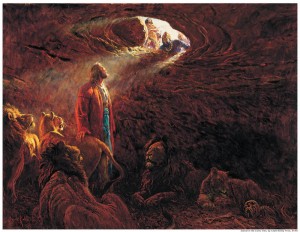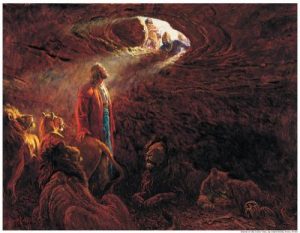On the surface, the first of the Ten Commandments -“Thou shalt have no other gods before me” — may seem to have little relevance to many of us today. But President Spencer W. Kimball, the twelfth president and prophet of The Church of Jesus Christ of Latter-day Saints (commonly known as the “Mormons“), had this to say about this commandment: “As I study ancient scripture, I am more and more convinced that there is significance in the fact that the commandment ‘Thou shalt have no other gods before me’ is the first of the Ten Commandments.” (Spencer W. Kimball, “The False Gods We Worship,” Ensign, June 1976, 3. Other quotes in this post from President Kimball are from the same address.)
 Idolatry, as commonly defined, is the worship of manmade gods. The prophet Daniel spoke of people who put their faith in “arm of flesh” and in “gods of silver, and gold, of brass, iron, wood, and stone, which see not, nor hear, nor know” (Daniel 5:23) Icons of man’s own making, composed of silver, iron, stone, or other materials, are things we might readily recognize as idols.
Idolatry, as commonly defined, is the worship of manmade gods. The prophet Daniel spoke of people who put their faith in “arm of flesh” and in “gods of silver, and gold, of brass, iron, wood, and stone, which see not, nor hear, nor know” (Daniel 5:23) Icons of man’s own making, composed of silver, iron, stone, or other materials, are things we might readily recognize as idols.
But President Kimball extends this definition. He said: “Whatever thing a man sets his heart and his trust in most is his god; and if his god doesn’t also happen to be the true and living God of Israel, that man is laboring in idolatry.”
I wonder how many of us profess a belief in God, but devote our energies to things of this world that ultimately don’t matter much. Of this, President Kimball said, “Many people spend most of their time working in the service of a self-image that includes sufficient money, stocks, bonds, investment portfolios, property, credit cards, furnishings, automobiles, and the like to guarantee carnal security throughout, it is hoped, a long and happy life.”
It’s easy to get caught up in the excitement and pursuit of wealth, status, worldly goods, and other means of carnal security and satisfaction. After all, we live in this world. Advertising and media bombard us from all directions, telling us that if we buy this product or follow that diet, we’ll be happy. Even people who consciously try to center their lives on following Christ usually still have to make a living in this world. Those who want to serve others in the world have to be in the world in order to do so.
But far too often, we find ourselves in the trap described by the prophet Moroni in the Book of Mormon. He lived and died around 400 A.D., but was privileged to see our day. See if his description of our time sounds familiar:
36 And I know that ye do walk in the pride of your hearts; and there are none save a few only who do not lift themselves up in the pride of their hearts, unto the wearing of very fine apparel, unto envying, and strifes, and malice, and persecutions, and all manner of iniquities; and your churches, yea, even every one, have become polluted because of the pride of your hearts.
37 For behold, ye do love money, and your substance, and your fine apparel, and the adorning of your churches, more than ye love the poor and the needy, the sick and the afflicted. (Mormon 8:36-37)
His mention of “fine apparel” in particular always gets to me. We’re so used to seeing clothing advertisements, fashion magazines, features on how we should dress for success, and so forth that it’s easy to get caught up in the false “need” for expensive clothing that will impress others. Not that we shouldn’t try to look nice, but our obsessions with worldly goods create other problems, as Moroni points out:
38 O ye pollutions, ye hypocrites, ye teachers, who sell yourselves for that which will canker, why have ye polluted the holy church of God? Why are ye ashamed to take upon you the name of Christ? Why do ye not think that greater is the value of an endless happiness than that misery which never dies-because of the praise of the world?
39 Why do ye adorn yourselves with that which hath no life, and yet suffer the hungry, and the needy, and the naked, and the sick and the afflicted to pass by you, and notice them not? (Mormon 8:38-39)
In other words, we become so focused on obtaining worldly goods for ourselves that we ignore – or fail to even notice – those who are in need of our help. And for what? Our worldly goods will bring us momentary pleasure, and perhaps praise of the world and some worldly security. But how long will that last? We can’t take these things with us when we die and pass to the next life.
President Kimball said: “What are we to fear when the Lord is with us? Can we not take the Lord at his word and exercise a particle of faith in him? Our assignment is affirmative: to forsake the things of the world as ends in themselves; to leave off idolatry and press forward in faith; to carry the gospel to our enemies, that they might no longer be our enemies.”
Notice that he said to forsake the things of the world as ends in themselves. He didn’t say that we had to go live alone in caves, and he didn’t say that we couldn’t try to have successful careers or attractive homes or money and resources saved up to use in times of need. But he did say, in effect, that these are merely tools to help us in this mortal life. They should not be our sole objectives.
President Kimball ends his message with some direction on how we can find true happiness:
We believe that the way for each person and each family to prepare as the Lord has directed is to begin to exercise greater faith, to repent, and to enter into the work of his kingdom on earth, which is The Church of Jesus Christ of Latter-day Saints. It may seem a little difficult at first, but when a person begins to catch a vision of the true work, when he begins to see something of eternity in its true perspective, the blessings begin to far outweigh the cost of leaving “the world” behind.
Herein lies the only true happiness, and therefore we invite and welcome all men, everywhere, to join in this work. For those who are determined to serve the Lord at all costs, this is the way to eternal life. All else is but a means to that end.


